As a holistic veterinarian, I understand how precious your Belgian Laekenois is to you. These beautiful dogs, with their alert, intelligent eyes, are truly a sight to behold. But those eyes, as expressive as they are, can sometimes be prone to certain health issues. That’s why it’s crucial to be well-informed about Belgian Laekenois Eye Health.
With their unique eye structure, Belgian Laekenois are susceptible to a variety of eye conditions. But don’t worry, with the right care and attention, many of these conditions can be managed or even prevented. This article will guide you through understanding your dog’s eye health, common issues, and preventive measures you can take. We’ll also discuss the role of diet and environmental hygiene in maintaining your Laekenois’s eye health.
Remember, as a responsible pet parent, your dog’s health is in your hands. By arming yourself with knowledge about Belgian Laekenois Eye Health, you can ensure your furry friend enjoys a life full of clear, healthy vision. So let’s get started on this journey to better understanding and caring for your Belgian Laekenois’s eyes.
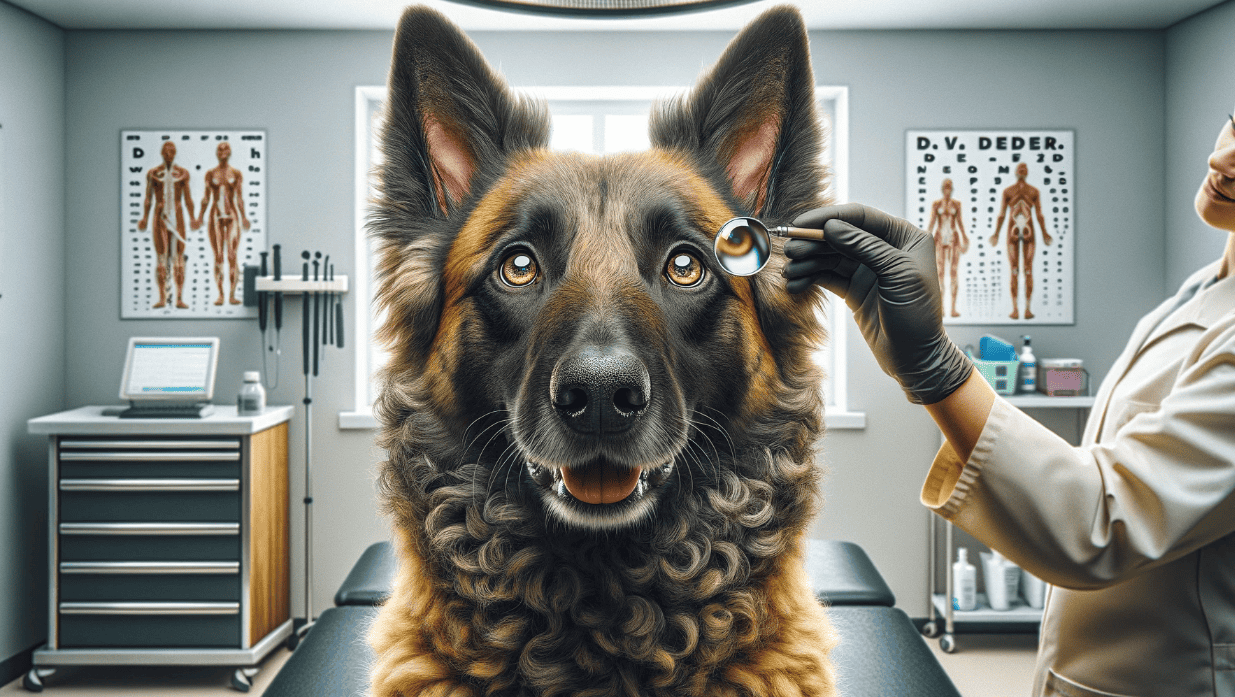
Understanding Breed Specific Eye Structure
Did you know that the unique eye structure of your Belgian Laekenois can greatly influence their eye health? Yes, that’s right! Understanding the specifics of their eye structure can help you provide better care for your furry friend, and potentially prevent eye-related health issues. So, let’s dive in!
The Belgian Laekenois, like other herding breeds, possesses an alert and intense gaze that is a characteristic feature of their breed. Their eyes are medium-sized, slightly almond-shaped, and set obliquely, giving them a wide field of vision. The color of their eyes typically ranges from medium to dark brown, and their eyelids are well pigmented.
One unique aspect of the Belgian Laekenois eye structure is the presence of a third eyelid, also known as the nictitating membrane. This additional eyelid aids in eye protection and moisture, but it can also be prone to certain health conditions.
The breed’s almond-shaped eyes and wide-set position help them to have an expansive field of view, which was crucial for their historical work as herding dogs. However, these same features can also predispose them to certain eye health issues. For instance, their wide-set eyes can make them more susceptible to dry eye, while their almond shape can lead to entropion, a condition where the eyelid rolls inward.
Understanding these specific aspects of your Belgian Laekenois’s eye structure is crucial in maintaining their eye health. By being aware of their unique features, you can better monitor their eyes for any signs of discomfort or changes in appearance. And remember, regular vet check-ups are essential to ensure your Belgian Laekenois maintains optimal eye health.
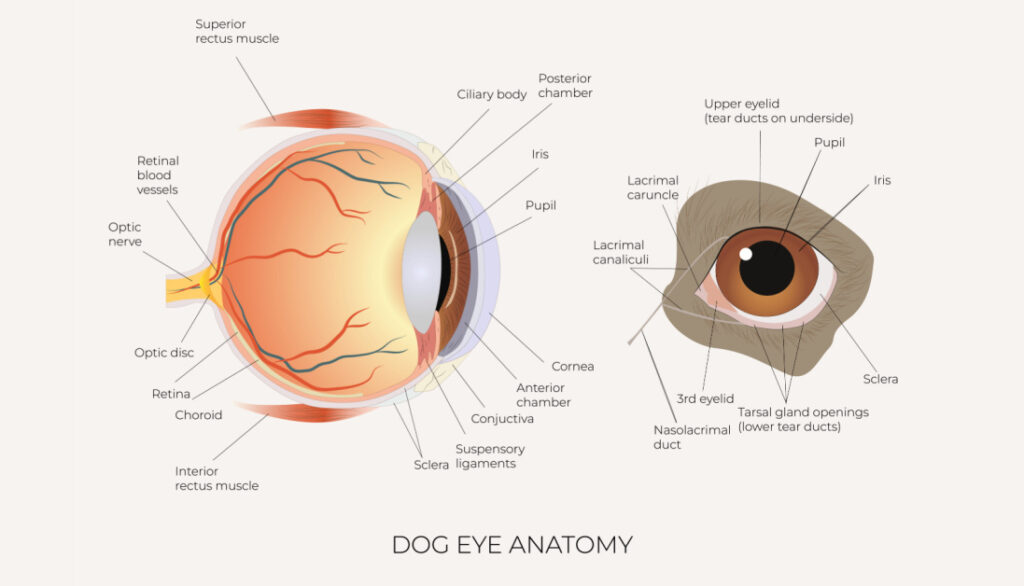
Common Eye Issues In Belgian Laekenois
As a veterinarian, I’ve had the opportunity to work with various breeds of dogs, and I’ve come to understand the unique health challenges each breed faces. When it comes to Belgian Laekenois eye health, there are several common issues that you, as a pet parent, should be aware of.
The first and most common issue is conjunctivitis, an inflammation of the conjunctiva, the thin clear tissue that lies over the white part of the eye and lines the inside of the eyelid. Symptoms include redness, itchiness, and discharge. If untreated, it can lead to more serious problems.
Next, corneal ulcers are also a prevalent problem. These ulcers are painful sores that form on the cornea, the clear outer layer of the eye. Signs include excessive tearing, squinting, and sensitivity to light.
Progressive Retinal Atrophy (PRA) is a genetic disease that causes the retina’s cells to die, leading to blindness. Although there’s no cure, early detection can help manage the condition.
Lastly, cataracts, which cause cloudiness in the lens of the eye, can also occur in Belgian Laekenois. This condition can lead to decreased vision and eventually blindness if left untreated.
- Conjunctivitis – redness, itchiness, discharge
- Corneal Ulcers – excessive tearing, squinting, light sensitivity
- Progressive Retinal Atrophy – gradual loss of vision, leading to blindness
- Cataracts – cloudiness in the lens, decreased vision, potential blindness
Remember, regular check-ups with a vet are crucial for early detection and treatment of these conditions. As a pet parent, it’s important to be aware of the signs and symptoms to ensure your Belgian Laekenois’s eye health is maintained.
Always consult your vet if you notice any changes in your dog’s eyes or behavior. With early detection and proper care, most of these conditions can be managed to ensure your Belgian Laekenois leads a happy and healthy life.
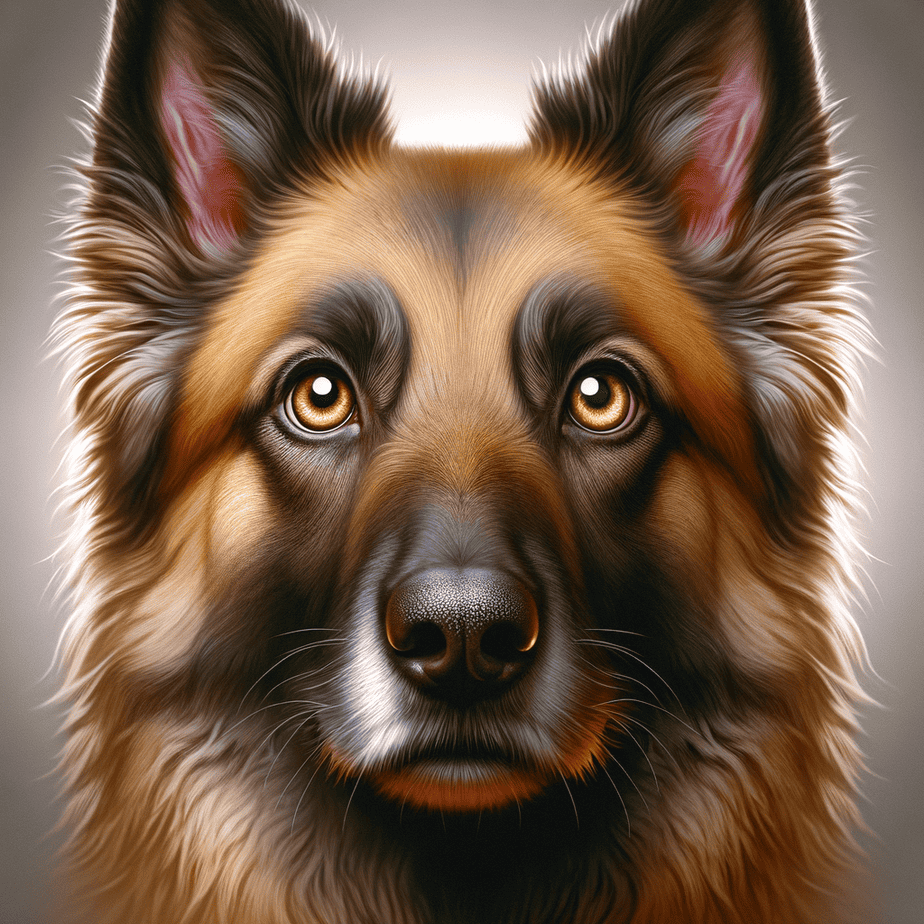
Prevention of Eye Problems
Ensuring your Belgian Laekenois gets the right nutrients for optimal eye health is essential for maintaining clear vision and preventing age-related issues. Natural, nutrient-rich foods and supplements can play a key role in supporting their eyesight. From vitamin A-packed freeze-dried liver treats to antioxidant-rich blueberries and targeted supplements like Eyeplex by Standard Process, there are several ways to nourish your dog’s eyes. In this section, we’ll explore how these powerful ingredients contribute to long-term vision health and overall well-being.
Eyeplex by Standard Process
Eyeplex by Standard Process is a specialized supplement designed to support your Belgian Laekenois’ eye health with a blend of essential nutrients. Formulated with key vitamins, minerals, and antioxidants, Eyeplex helps protect against oxidative stress, supports retinal function, and promotes overall vision health. Ingredients like vitamin A, vitamin C, and zinc contribute to maintaining strong eyesight, while whole food ingredients provide additional phytonutrients for cellular protection. Adding Eyeplex to your Belgian Laekenois’ diet can be especially beneficial for aging dogs or breeds prone to eye conditions, offering targeted nutritional support to keep their vision sharp and healthy for years to come.
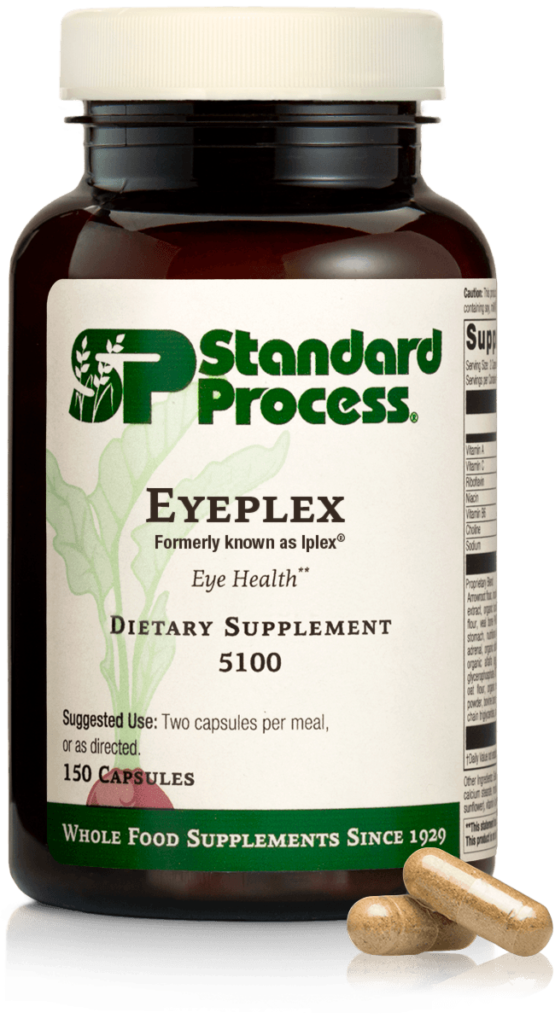
Freeze-Dried Blueberries
Freeze-dried blueberries are a powerhouse of antioxidants that can help protect your Belgian Laekenois’ eyes from oxidative stress and age-related damage. Rich in vitamins C and E, as well as anthocyanins, these tiny but mighty berries help combat free radicals that can contribute to eye diseases like cataracts and macular degeneration. Incorporating freeze-dried blueberries into your dog’s diet provides a natural and delicious way to support retinal health, reduce inflammation, and promote overall vision longevity. Plus, they’re a low-calorie, dog-friendly treat that makes a great addition to a balanced diet for long-term eye health.
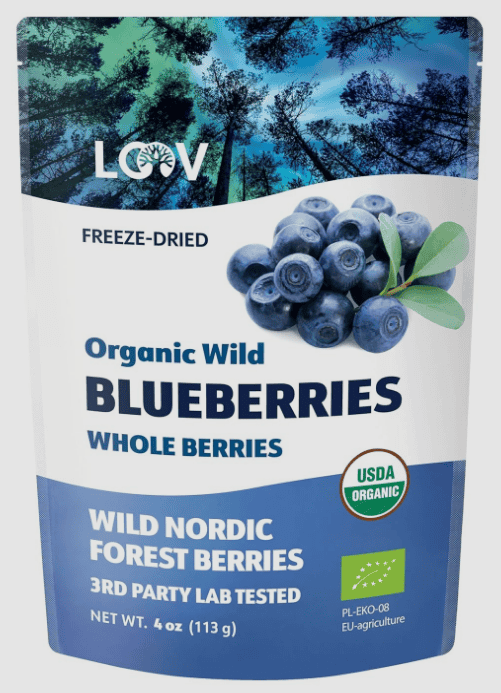
Freeze-Dried Liver
Freeze-dried liver treats are an excellent natural source of vitamin A, an essential nutrient for your Belgian Laekenois’ eye health. Vitamin A plays a crucial role in maintaining good vision, especially in low-light conditions, while also supporting overall immune function and skin health. Since liver is rich in bioavailable vitamin A, incorporating freeze-dried liver treats into your dog’s diet provides a convenient and nutritious way to promote optimal eye function. Just be sure to feed them in moderation, as excessive vitamin A can lead to toxicity. Adding these nutrient-packed treats to your pup’s routine is a simple, tasty way to support their long-term vision and well-being!
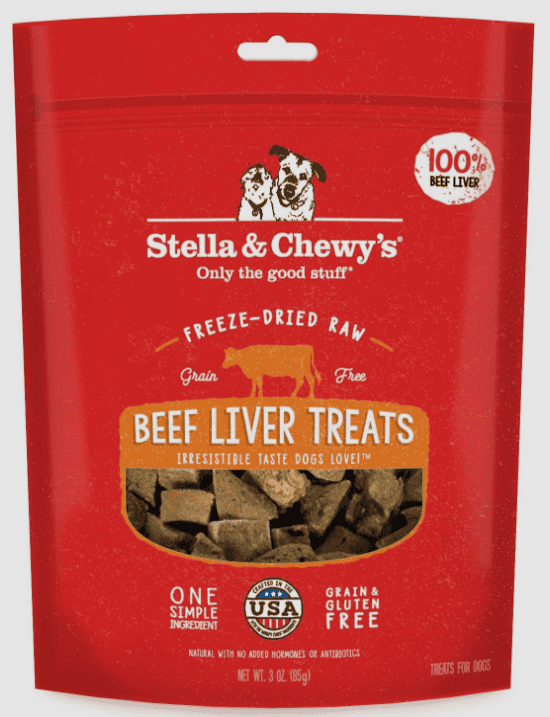
By prioritizing your Belgian Laekenois’ eye health through a balanced diet and nutritional supplements, you can help prevent many common eye issues. These simple steps can go a long way in ensuring your pup’s eyes stay healthy and clear for years to come.
When it comes to maintaining the eye health of your Belgian Laekenois, environmental hygiene plays a crucial role. Poor environmental conditions can lead to a variety of eye problems, from minor irritations to severe infections. So, let’s delve into how you can create a safe and clean environment for your furry friend.
Indoor Air Quality
Firstly, the quality of indoor air can significantly affect your Belgian Laekenois eye health. Dust, dander, and other airborne particles can irritate their eyes, leading to redness, itching, and potential infections. Here are a few tips to improve your indoor air quality:
- Regularly clean and vacuum your home to reduce dust and pet dander.
- Invest in an air purifier to filter out harmful particles.
- Ensure good ventilation in your home. Open windows and doors when possible to allow fresh air in.
- Avoid smoking indoors as tobacco smoke can severely irritate your pet’s eyes.
Sprays, Diffusers, Candles, Incense
Secondly, be mindful of the products you use in your home. Many sprays, diffusers, candles, and incense can emit chemicals that are harmful to your Belgian Laekenois’ eyes. Even some cleaning products can cause irritation. Here’s how you can mitigate these risks:
- Choose pet-friendly cleaning products. These are usually free from harsh chemicals and are less likely to irritate your pet’s eyes.
- Avoid using air fresheners, diffusers, or scented candles in areas where your pet spends a lot of time.
- If you must use these products, ensure your pet has access to a well-ventilated area where they can escape from the scent.
By maintaining a clean and safe environment, you can significantly reduce the risk of eye problems in your Belgian Laekenois. Remember, their eyes are just as sensitive as ours, if not more. So, it’s essential to keep their surroundings as free from potential irritants as possible. By doing so, you’ll be taking a significant step towards ensuring the optimal eye health of your Belgian Laekenois.
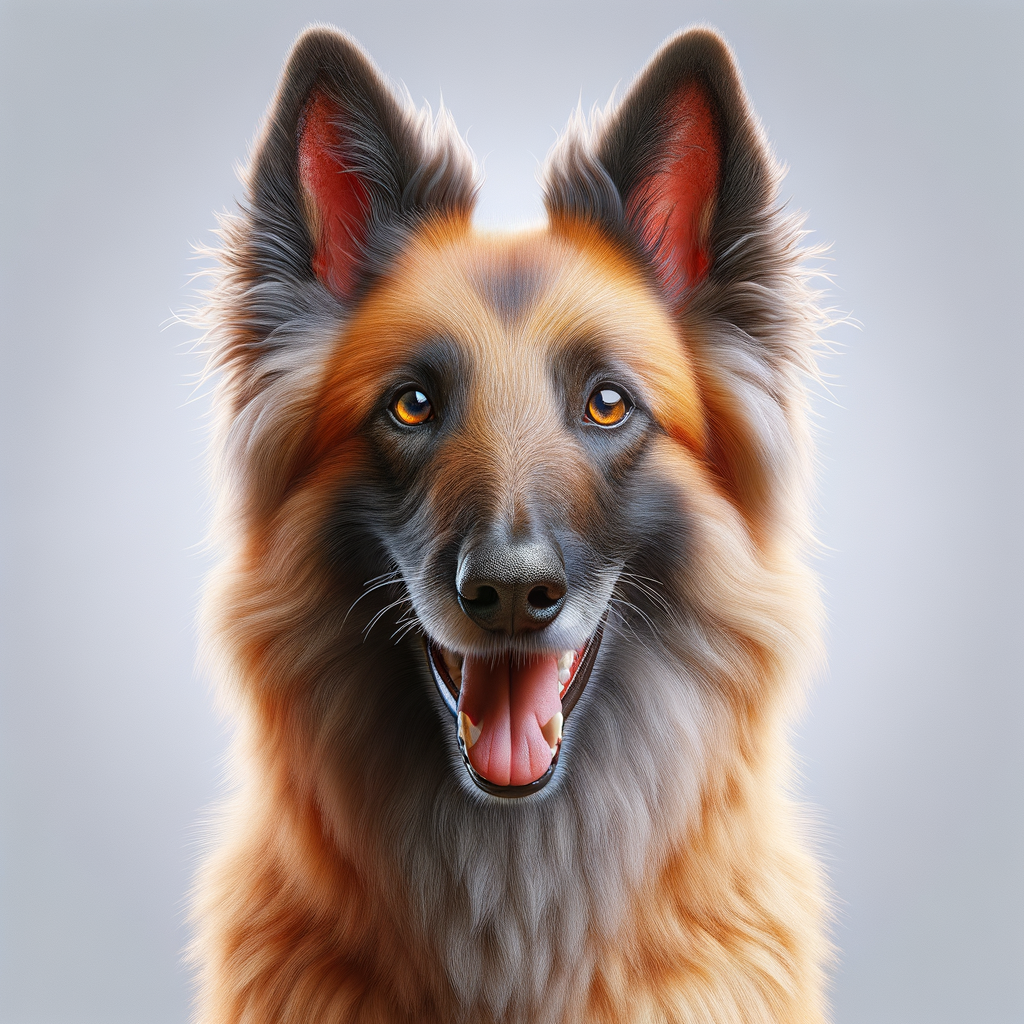
Routine Belgian Laekenois Eye Care & Maintenance
As a proud parent of a Belgian Laekenois, you know that maintaining your furry friend’s eye health is crucial. Here are some useful tips for daily and weekly care and maintenance that can help keep your Laekenois’s eyes in top shape.
Daily & Weekly Care & Maintenance
- Regular Eye Checks: Make it a habit to check your Belgian Laekenois’s eyes daily. Look for any signs of redness, cloudiness, or discharge. If you notice anything unusual, it’s time to consult your vet.
- Clean the Eyes: Use a damp cotton ball or a pet-safe eye wipe to gently clean around your dog’s eyes. This can help prevent the build-up of dirt or bacteria that could cause infections.
- Lubricate the Eyes: If your dog’s eyes seem dry or irritated, a vet-approved eye lubricant can help. Always consult with your vet before using any new products.
Monitor Hair Length, Nail Length, Bath Frequency
Other aspects of your Laekenois’s overall hygiene can also affect their eye health. Here’s what to keep an eye on:
- Hair Length: Long hair around the eyes can cause irritation and even lead to eye infections. Regularly trim the hair around your dog’s eyes to keep their vision clear and prevent any potential issues.
- Nail Length: Long nails can accidentally scratch the eyes, causing serious injury. Regular nail trims are essential for your dog’s overall health, including their eye health.
- Bath Frequency: Regular baths can help keep your Belgian Laekenois clean and free from potential eye irritants. However, be careful not to get soap or water in your dog’s eyes during bath time, as this can cause irritation.
Remember, regular vet check-ups are also vital for maintaining your Belgian Laekenois’s eye health. Your vet can spot early signs of eye conditions and provide the necessary treatments to keep your furry friend’s eyes healthy.
By incorporating these eye care tips into your regular routine, you’ll be taking a huge step towards ensuring your Belgian Laekenois’s eyes stay healthy. After all, a little preventative care can go a long way in maintaining your dog’s overall health and wellbeing.
Frequently Asked Questions
1. What are common eye health conditions in Belgian Laekenois?
Common eye health conditions in Belgian Laekenois include:
- Progressive Retinal Atrophy (PRA)
- Cataracts
- Entropion
- Ectropion
- Cherry Eye
2. How can I identify eye health problems in my Belgian Laekenois?
Watch out for the following signs that may indicate eye health problems:
- Excessive tearing or discharge
- Redness or inflammation
- Cloudiness or opacity in the eye
- Squinting or rubbing of the eyes
- Visible third eyelid
3. Can eye health conditions in Belgian Laekenois be treated?
Yes, many eye health conditions in Belgian Laekenois can be treated. The specific treatment depends on the condition diagnosed by a veterinarian. It may involve medication, surgery, or other interventions.
4. How can I prevent eye health problems in my Belgian Laekenois?
To help prevent eye health problems in your Belgian Laekenois, follow these tips:
- Regularly clean your dog’s eyes and surrounding area
- Keep the hair around the eyes trimmed to prevent irritation
- Avoid exposing your dog to harsh environmental factors
- Provide a balanced diet with essential nutrients for eye health
- Schedule regular check-ups with a veterinarian
5. When should I consult a veterinarian regarding my Belgian Laekenois’ eye health?
You should consult a veterinarian if you notice any signs of eye discomfort or abnormalities in your Belgian Laekenois. Early detection and prompt treatment can help prevent further complications and ensure your dog’s eye health.
